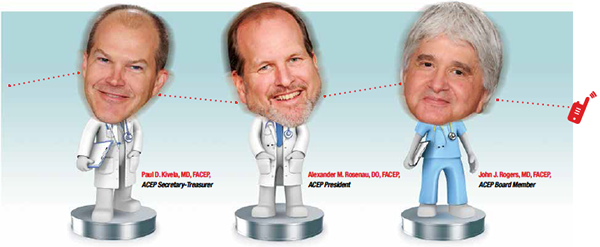
There were several other things he learned about how they think, how they view physicians, how they make decisions, etc. I’ve asked him to put his observations down as a report to the ACEP Board of Directors. Hope he does.
Explore This Issue
ACEP Now: Vol 33 – No 04 – April 2014—John J. Rogers, MD, FACEP, ACEP Board Member

Great point, Paul, and good feedback, John.
Is there a way to change the conversation back to patient advocacy? Most patients want to see the system get better/improve (eg, heparin and Dennis Quaid’s twins). Any studies out there that safe harbors allow for more error reporting, error reduction efforts, and open conversations when issues occur? It represents an agreement with physicians and patients that we commit to following evidence-based decision making whenever possible, understanding the risks.
—Rebecca B. Parker, MD, FACEP, ACEP Board Member
My understanding is there are safe harbors in just about any other field, from construction to accounting. Why don’t we establish safe harbors and say that ACEP recommends the following safe harbors? Reality is that there’s no such thing as a medical malpractice case, or any malpractice case, without an expert witness saying that something has deviated from the standard of care.
Let’s move forward and try something different. Let’s establish safe harbors and advertise that this will save waste from the system. I say we just establish that ACEP determines the standard of care consensus-wise for emergency medicine. We need to come up with the campaign slogan and go with it and see what happens. Doesn’t mean you can’t do more, but you will be protected if you do what is the recommendation. I don’t think it needs to be any more complex or complicated than this, and I don’t think we have to ask for anybody’s approval. Let’s be bold.
Safe harbors to improve patient safety and decrease health care costs.
Safe harbors is smart and informed medicine.
—Paul D. Kivela, MD, FACEP, ACEP Secretary-Treasurer
I like the approach of creating safe harbors to give emergency physicians the confidence to practice evidence-based medicine without fear of litigation. This has to be patient-centered so that we are not viewed as self-serving when promoting safe harbors. As a practical matter, could we refer this to the medicolegal committee?
—Robert E. O’Connor, MD, FACEP, ACEP Vice President
I agree with moving forward with creation of safe harbors with appropriate efforts to approach it from a quality perspective with careful attention to not appear speaking from a self-serving perspective. The medicolegal committee might be a good place to start with this.





No Responses to “ACEP Reacts to Issue of Creating Safe Harbor Protections for Following Clinical Guidelines”